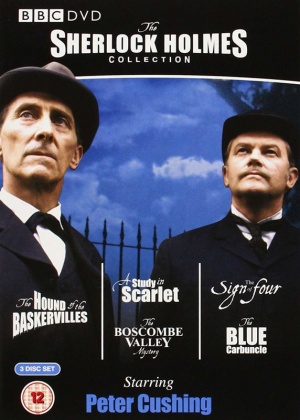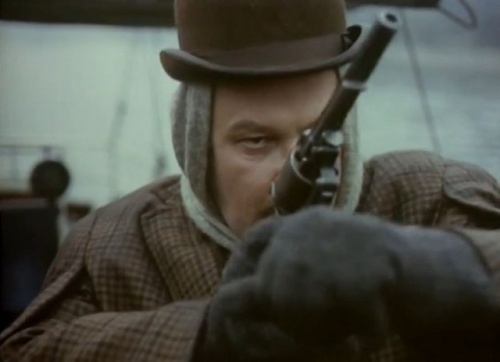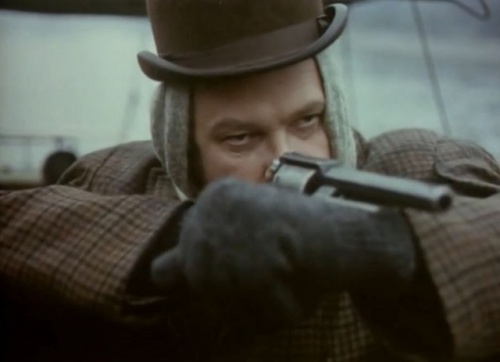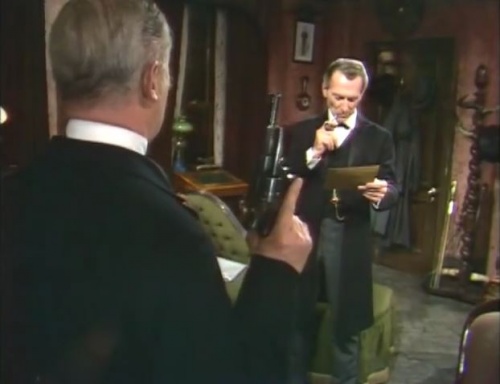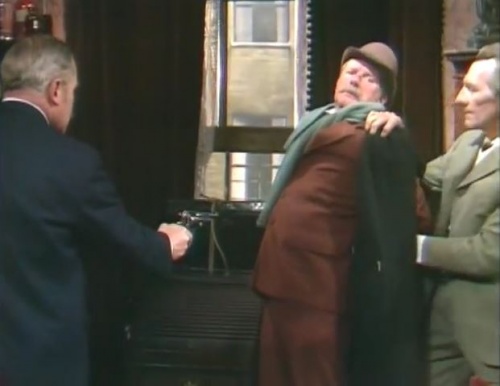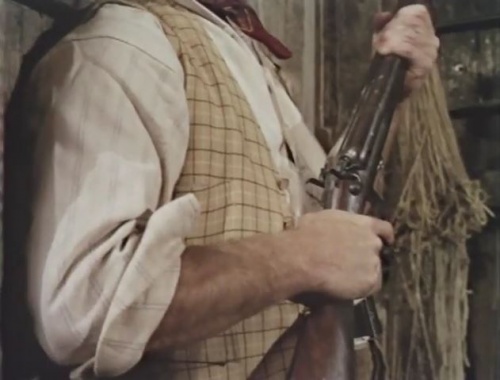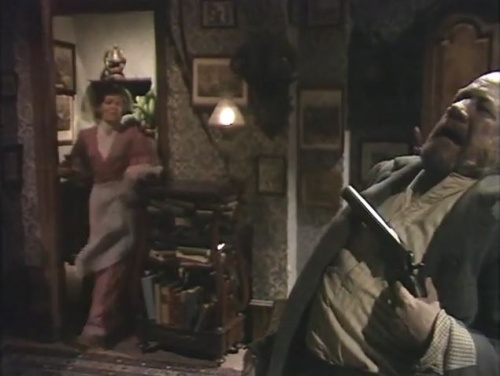| Sherlock Holmes
|
|
DVD Cover for 5 episodes from 1968 release
|
| Country
|
 UK UK
|
| Channel
|
BBC1
|
| Creator
|
David Goddard
William Sterling
|
| Main Cast
|
| Character
|
Actor
|
| Sherlock Holmes
|
Peter Cushing
|
| Dr. Watson
|
Nigel Stock
|
| Mrs. Hudson
|
Grace Arnold
|
| Inspector Lestrade
|
William Lucas
|
| Inspector Gregson
|
George A. Cooper
|
|
|
Sherlock Holmes (also known as Sir Arthur Conan Doyle's Sherlock Holmes and The Cases of Sherlock Holmes) is a British BBC TV series about the adventures of the great detective. It was released in two seasons: 1964-1965, in B&W, starring Douglas Wilmer as Sherlock Holmes and Nigel Stock as Dr. Watson; and in 1968, in color, starring Peter Cushing as Sherlock Holmes and Nigel Stock as Dr. Watson.
The current page is based on DVD release that contains 5 episodes (one in 2 parts) from 1968 release.
The following weapons were used in the television series Sherlock Holmes:
Revolvers
Adams Revolver
Dr. Watson (Nigel Stock) uses an Adams Revolver in "The Hound of the Baskervilles" and "The Sign of Four". It appear to be a Mk II or Mk III model.
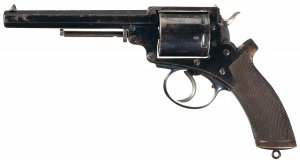
Adams Mk II revolver - .450 Adams
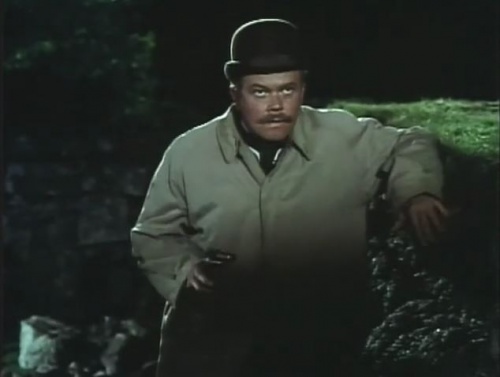
Watson holds his revolver in the night scene in "The Hound of the Baskervilles".
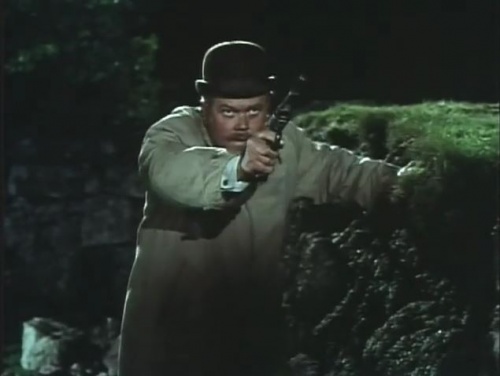
Another view of the same scene. The side mounted extractor of the revolver is seen.
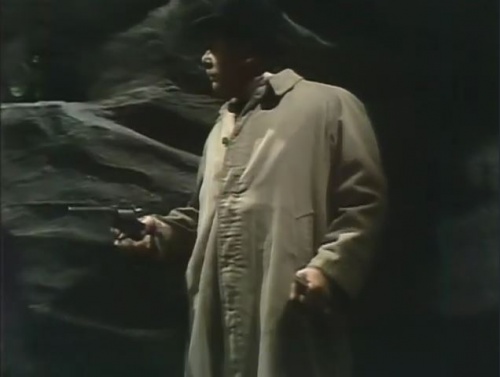
Watson lying in wait for the mysterious man in the latter's hideout on the marshes (not knowing that this person is Holmes).

Another view of the same scene.
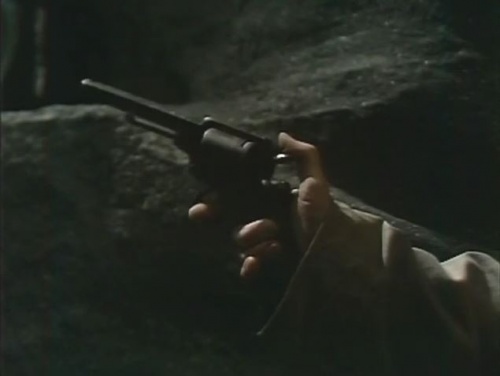
A closeup of Watson's revolver.
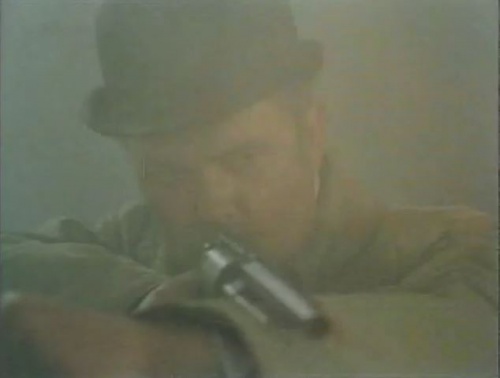
Watson fires at the hound. Holmes also fires at the hound in this scene but his weapon isn't seen.
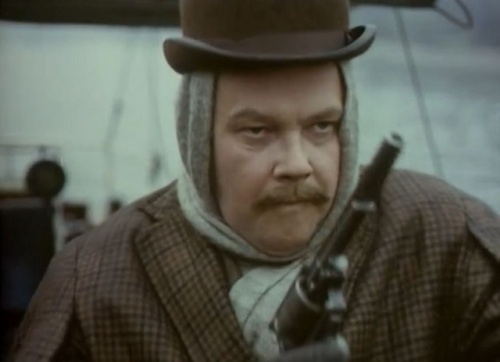
Watson holds his revolver during the boat chase in "The Sign of Four".
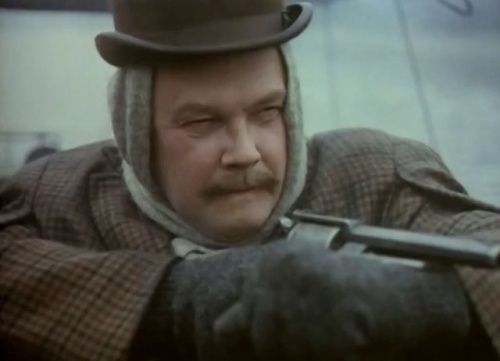
Watson fires at Tonga who aims a blowpipe.
Chamelot-Delvigne style revolver
A revolver, similar to Chamelot-Delvigne Model 1873 but with somewhat different appearance, is used by Dr. Watson (Nigel Stock) in "A Study in Scarlet" (in following episodes Watson has an Adams revolver). Possibly this is not an original French military revolver but some commercial version of French or Belgian origin.

Chamelot-Delvigne Mle. 1873 (factory bare finish) - 11x17.8mmR
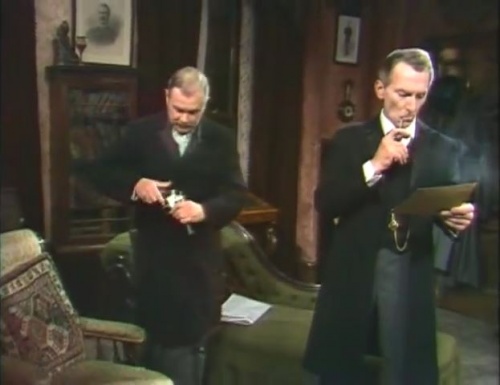
Watson readies his revolver while wating for the person who will will respond to the announcement of the found ring.
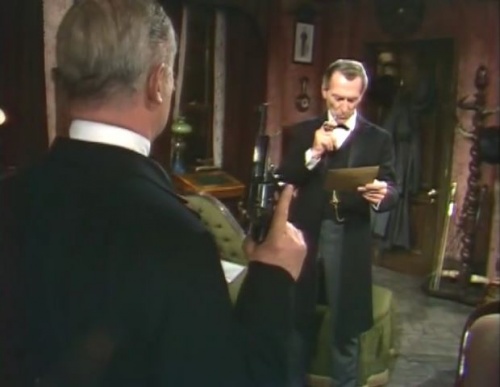
Watson holds his revolver.

A close view of the revolver. Note that the front part of the frame looks different from the French military Mle 1873.
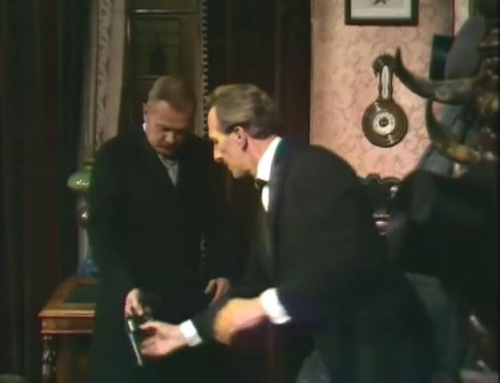
Sherlock Holmes (
Peter Cushing) takes Watson's revolver who chases the mysterious lady, escaping with the ring.
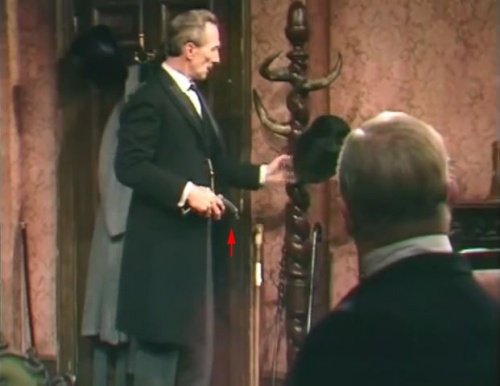
The grip of the revolver is seen when Holmes returns back with nothing.
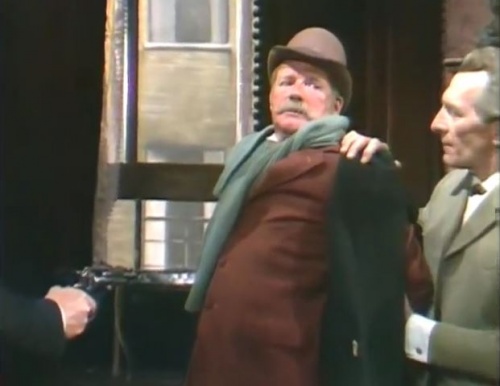
Watson aims at Jefferson Hope (Larry Cross), arrested by Holmes.
Rifles
Enfield Pattern 1856 Short Rifle
Soldiers, patrolling the countryside in "The Hound of the Baskervilles", carry percussion cap rifles, most likely Enfield Pattern 1856 Short Rifles (an outdated weapon for 1889 when the story is set).

For comparison: Modern replica of 1856 Enfield Short Rifle, manufactured by Chiappa Firearms - .58
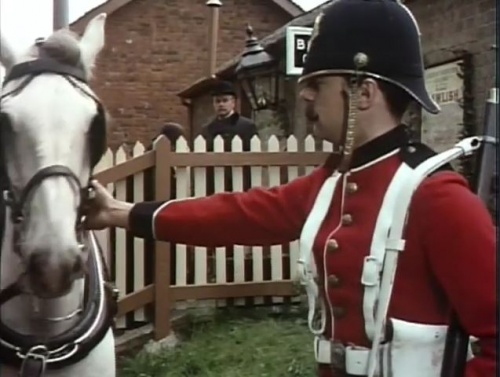
A cavalryman on railway station carries a rifle. The space between the top barrel band and the sling swivel is too large for
Enfield Pattern 1856 Cavalry Carbine but looks similar to Short Rifle. For some reason these "cavalrymen" also wear the 1888-pattern infantry kit, instead of the correct cartridge bag over the shoulder.
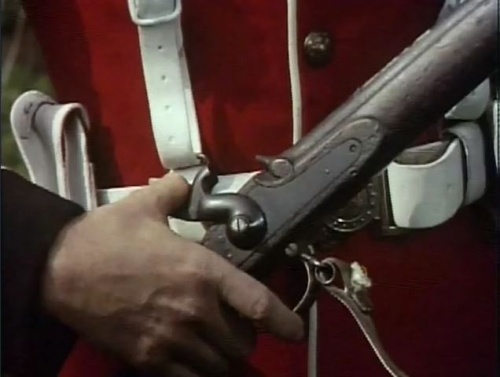
A closeup of the percussion cap lock. Note the lack of the small cap on the pin.
Shotguns
Double Barreled Shotgun
Several double barreled shotguns are seen in McCarthy's farm in "The Boscombe Valley Mystery". James McCarthy (Nick Tate) takes one of these guns.
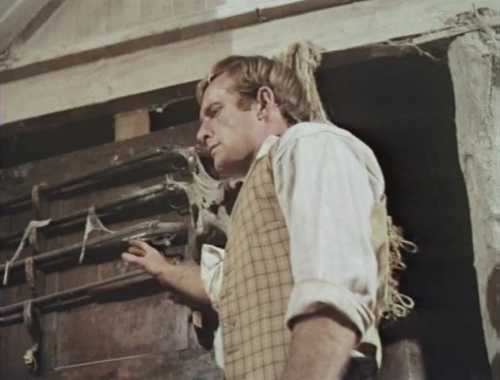
Four shotguns on the wall in farm.
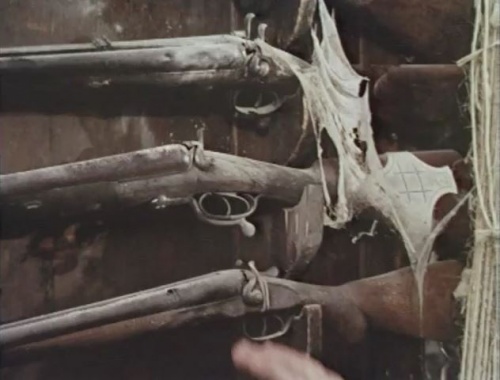
A close view. All shotguns have exposed hammers.
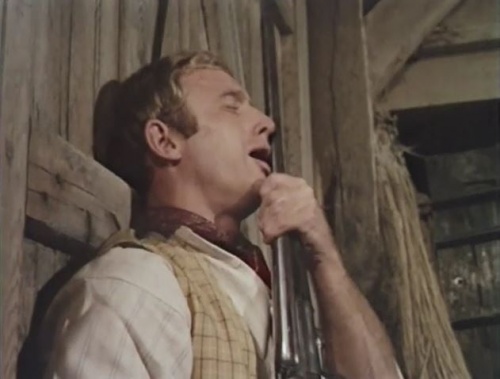
James McCarthy holds a shotgun.
Other Weapons
Hebel Flare Pistol Model 1894
A Hebel Flare Pistol Model 1894 (or some other very similar flare pistol) is seen in hands of John Turner (John Tate) in "The Boscombe Valley Mystery". Possibly this flare pistol is used as a substitution for single shot pistols of late 19th century.
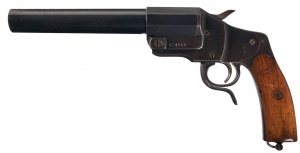
Hebel Flare Pistol M1894 - 26.5mm

Terminally ill and frightened to death John Turner grabs the gun.
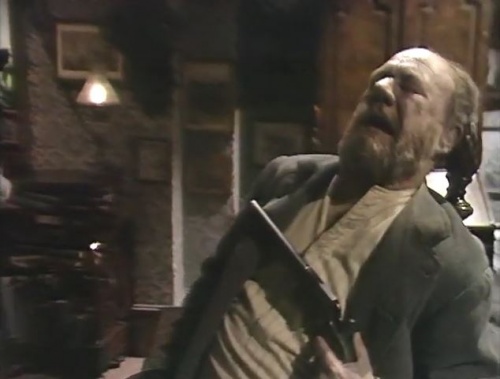
John Turner holds the gun.
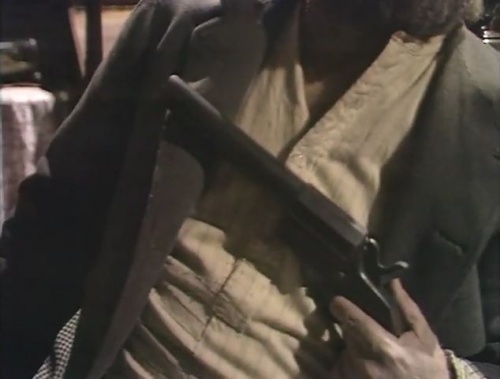
A close view of the flare pistol. The hammer and the rear part of the frame look slightly different from Hebel 1894 but such flare pistols were produced by many manufacturers in several countires and had external variations.


